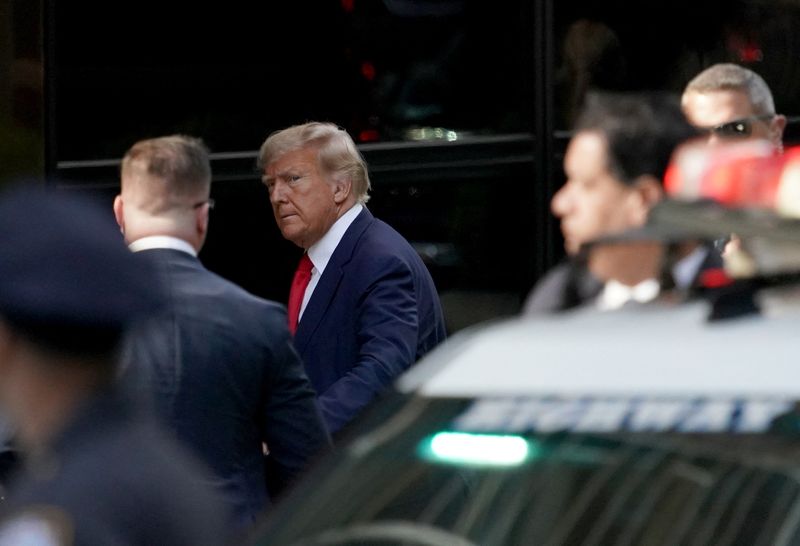Trump widens lead in 2024 Republican presidential primary
2023.04.03 19:34

© Reuters. Former U.S. President Donald Trump arrives at Trump Tower, after his indictment by a Manhattan grand jury following a probe into hush money paid to porn star Stormy Daniels, in New York City, U.S April 3, 2023. REUTERS/David Dee Delgado
By Richard Cowan
WASHINGTON (Reuters) – Former U.S. President Donald Trump has widened his lead over his rivals in the 2024 Republican presidential nominating contest, even as he faces criminal charges in New York, according to a Reuters/Ipsos poll released on Monday.
Some 48% of self-described Republicans say they want Trump to be their party’s presidential nominee, up from 44% in a March 14-20 poll.
Some 19% back his closest rival, Florida Governor Ron DeSantis, down from 30% last month. Other likely rivals polled in the single digits.
The online poll was conducted between March 31 and April 3, after news broke that Trump would face criminal charges related to hush money paid to a porn star before the 2016 election.
Trump is the first U.S. president to face criminal indictment. He is expected to plead not guilty at a Manhattan courthouse on Tuesday.
DeSantis in recent weeks has been buffeted by criticism over a March 13 statement in which he said that it was not a vital U.S. national interest to become “further entangled in a territorial dispute between Ukraine and Russia.”
Trump has stepped up his attacks on DeSantis, who has not formally announced his candidacy but is expected to run.
Some 71% of Americans, including 58% of Republicans, say it is believable that Trump paid porn star Stormy Daniels to keep quiet about an affair ahead of the 2016 presidential election. Trump has proclaimed his innocence and denied the affair, though he has acknowledged paying Daniels.
At the same time, 51% of poll respondents, including 80% of Republicans, said they believed the charges are politically motivated.
Those figures are largely unchanged from last month.
The survey of 706 U.S. adults has a credibility interval, a measure of precision, of plus or minus 2.7 percentage points for all respondents and plus or minus 4.5 percentage points for Republicans.








